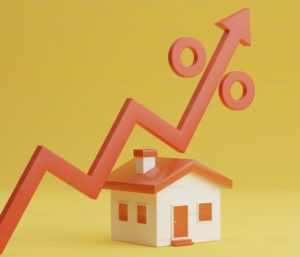
The real estate market is sensitive to various factors, and one of the most influential among them is the interest rate. As interest rates fluctuate, they can significantly impact both buyers and sellers. In this blog post, we will delve into the effects of rising interest rates on the real estate market, exploring how they can shape buyer behavior, housing affordability, and overall market dynamics.
- Decreased Affordability:
When interest rates rise, the cost of borrowing money to finance a home purchase also increases. This decrease in affordability can deter potential buyers from entering the market or force them to reconsider their budget. Higher interest rates result in higher monthly mortgage payments, making it more challenging for buyers to qualify for loans and afford homes that were once within their reach. Consequently, the demand for housing may soften, leading to slower sales and potential price corrections.
- Impact on Buyer Demand:
Rising interest rates can influence buyer demand in several ways. Firstly, as mentioned earlier, higher rates can decrease affordability, leading to fewer buyers actively seeking properties. Secondly, some buyers may rush to purchase homes before rates rise further, creating a temporary surge in demand. This influx of buyers can lead to increased competition and potentially drive prices higher. However, once rates stabilize at a higher level, the demand may taper off, resulting in a slowdown in the market.
- Shift in Housing Preferences:
As interest rates rise, buyers may adjust their housing preferences. Higher borrowing costs can push some buyers towards more affordable options like smaller homes, different neighborhoods, or alternative housing types. Additionally, buyers may focus on properties with more favorable interest rates, such as fixed-rate mortgages, to protect themselves from potential future rate increases. This shift in housing preferences can impact market dynamics and the desirability of certain property types.
- Impact on Existing Homeowners:
Rising interest rates not only affect potential buyers but also impact existing homeowners. Homeowners with adjustable-rate mortgages (ARMs) may experience higher monthly payments as rates increase, potentially leading to financial strain. Some homeowners may opt to sell their properties to avoid rising costs or refinance to secure a more favorable rate. The decision of existing homeowners to enter or exit the market can further influence inventory levels and overall market conditions.
- Investor Behavior:
Rising interest rates can also impact real estate investors. Higher borrowing costs may reduce the profitability of investment properties, especially if rental income does not keep pace with increased mortgage payments. This can deter some investors from entering the market or prompt them to adjust their investment strategies. However, rising interest rates can also lead to higher rental demand, as potential buyers may delay purchasing homes and opt to rent instead. Savvy investors can capitalize on this increased rental demand by offering attractive rental properties.
Conclusion:
The impact of rising interest rates on the real estate market is multifaceted and interconnected. Affordability, buyer demand, housing preferences, existing homeowners, and investors are all influenced by fluctuations in interest rates. As a real estate professional or market participant, it is crucial to closely monitor interest rate trends and understand their potential implications. By staying informed and adapting strategies accordingly, one can navigate the changing market dynamics and assist clients effectively in achieving their real estate goals.
While rising interest rates can present challenges, it is important to note that they are just one factor in the complex real estate landscape. Local market conditions, economic factors, and buyer/seller sentiment also play significant roles. By combining a thorough understanding of these factors with proactive adaptation, the real estate industry can continue to thrive, even in the face of rising interest rates.




